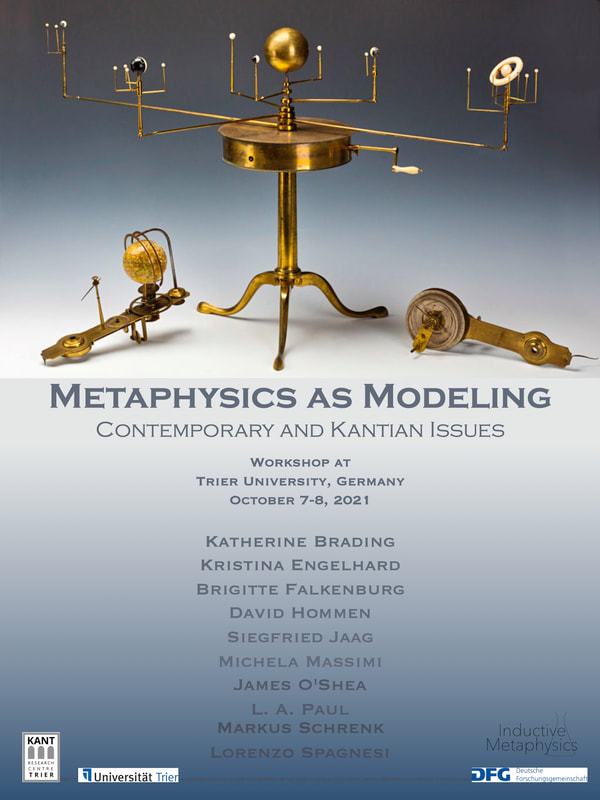Metaphysics as Modelling. Contemporary and Kantian Issues
University of Trier, Germany
Oct 7.-8. 2021
University of Trier, Germany
Oct 7.-8. 2021
SPEAKERS:
Katherine Brading
Kristina Engelhard
Brigitte Falkenburg
Axel Gelfert
David Hommen
Michela Massimi
Sigfried Jaag/Markus Schrenk
James O'Shea
L. A. Paul
Lorenzo Spagnesi
AIMS & SCOPE:
The use of models such as the Lotka-Volterra model for predator/prey-population-dynamics or the billiard ball model of gases have proven to be tremendously useful in the natural sciences. Here, we adopt the minimal working assumption that a "model is an imagined or hypothetical structure that we describe and investigate in the hope of using it to understand some more complex, real- world 'target' system or domain" (Godfrey-Smith 2006a, 6).
Recently, philosophers have suggested that applying models in metaphysics is also a legitimate, beneficial and necessary enterprise (Godfrey-Smith 2006a, 2012; Nolan 2005; Paul 2012; Brading manuscript for a critique). As examples for models in metaphysics have been given: Humean supervenience and Armstrong's anti-Humeanism (Godfrey-Smith 2006a, 16) or the neuron diagrams in theories of causation (Paul 2012, 14), etc.
The workshop takes place as part of the research group "Inductive Metaphysics" (https://indmet.weebly.com), funded by the Deutsche Forschungsgemeinschaft (DFG).
ORGANISATION:
Kristina Engelhard (Trier), David Hommen (Trier), Siegfried Jaag (Düsseldorf), Markus Schrenk (Düsseldorf)
PROGRAMME DETAILS:
For details of the programme, please see our website https://www.uni-trier.de/universitaet/fachbereiche-faecher/fachbereich-i/faecher-und-institute/philosophie/forschung/kant-forschungsstelle/veranstaltungen-1
COSTS:
Attendance (both in-person and online) is free, but registration is required.
ACCESSABILITY:
The event will be hybrid.
VENUE:
On site it will take place at Trier University, lecture hall A 9-A10.
REGISTRATION:
For registration please contact PD Dr. David Hommen ([email protected]). In case you want to attend the conference on site please register because the number of seats is limited due to Covid-measures. In case you want to attend the conference online you will get access data after your registration.
Katherine Brading
Kristina Engelhard
Brigitte Falkenburg
Axel Gelfert
David Hommen
Michela Massimi
Sigfried Jaag/Markus Schrenk
James O'Shea
L. A. Paul
Lorenzo Spagnesi
AIMS & SCOPE:
The use of models such as the Lotka-Volterra model for predator/prey-population-dynamics or the billiard ball model of gases have proven to be tremendously useful in the natural sciences. Here, we adopt the minimal working assumption that a "model is an imagined or hypothetical structure that we describe and investigate in the hope of using it to understand some more complex, real- world 'target' system or domain" (Godfrey-Smith 2006a, 6).
Recently, philosophers have suggested that applying models in metaphysics is also a legitimate, beneficial and necessary enterprise (Godfrey-Smith 2006a, 2012; Nolan 2005; Paul 2012; Brading manuscript for a critique). As examples for models in metaphysics have been given: Humean supervenience and Armstrong's anti-Humeanism (Godfrey-Smith 2006a, 16) or the neuron diagrams in theories of causation (Paul 2012, 14), etc.
The workshop takes place as part of the research group "Inductive Metaphysics" (https://indmet.weebly.com), funded by the Deutsche Forschungsgemeinschaft (DFG).
ORGANISATION:
Kristina Engelhard (Trier), David Hommen (Trier), Siegfried Jaag (Düsseldorf), Markus Schrenk (Düsseldorf)
PROGRAMME DETAILS:
For details of the programme, please see our website https://www.uni-trier.de/universitaet/fachbereiche-faecher/fachbereich-i/faecher-und-institute/philosophie/forschung/kant-forschungsstelle/veranstaltungen-1
COSTS:
Attendance (both in-person and online) is free, but registration is required.
ACCESSABILITY:
The event will be hybrid.
VENUE:
On site it will take place at Trier University, lecture hall A 9-A10.
REGISTRATION:
For registration please contact PD Dr. David Hommen ([email protected]). In case you want to attend the conference on site please register because the number of seats is limited due to Covid-measures. In case you want to attend the conference online you will get access data after your registration.

